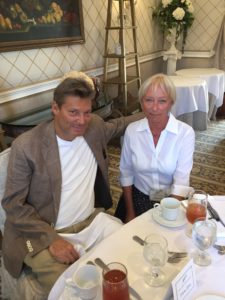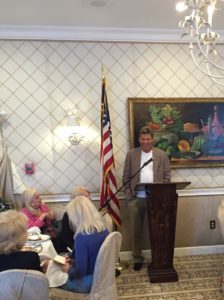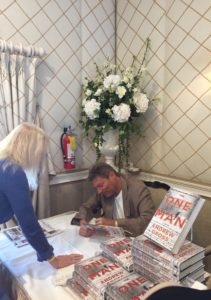 It’s News Squib Saturday. Time to share the best, most interesting (or most entertaining, or most outrageous) tidbit of information I’ve gleaned from all the stuff I’ve read –or done. This week: Lunch with Andrew Gross, author of The One Man (no, it’s not about James Patterson.)
It’s News Squib Saturday. Time to share the best, most interesting (or most entertaining, or most outrageous) tidbit of information I’ve gleaned from all the stuff I’ve read –or done. This week: Lunch with Andrew Gross, author of The One Man (no, it’s not about James Patterson.)
As bestselling author, Andrew Gross tells it, he was sitting in his den, after double-digit rejections of his first novel by agents and publishers, and wondering “what cliff to drive our SUV off” when his phone rang and the voice on the other end asked him if he would take a call from James Patterson.

It’s the stuff of dreams for struggling authors everywhere: One moment you’re staring at a wall plastered with rejection slips, the next you’re rocketing up the bestseller charts with James Patterson. Gross told more than 45 guests at a sold-out Palm Beach Writers Group lunch at The Chesterfield this week that with that call best selling author Patterson “rescued” him from “the kind of choices in life I didn’t want to make.” Patterson offered him the chance to work in a partnership that would put Andy’s name alongside Patterson’s on five #1 New York Times bestsellers including Lifeguard and Judge and Jury.
Does “Women Well”
His break came because an editor at Patterson’s publishing house who read Gross’ manuscript turned it down, but sent it to Patterson with the note “this guy does women well.” Since then Patterson has gone on to turn his own name into one of the world’s best known brands by producing astounding numbers of novels a year with the help of co-authors. Andy Gross went on to write ten New York Times bestselling “suburban” thrillers in his own right starting with The Blue Zone. Now, he has produced a historical thriller, The One Man, based, in part, on the true life story of his father-in-law who escaped Warsaw just months before the outbreak of World War II. Kirkus Reviews described the book as “Gross’ best work yet.”
And Makes Them Laugh
 Gross had the Palm Beach Writers Group in stitches as he described his transition from working in the family garment business, Leslie Fay Company, to being fired from his position of president of a sports apparel company and deciding then to follow his dream of being a writer. He told his family he needed a year.
Gross had the Palm Beach Writers Group in stitches as he described his transition from working in the family garment business, Leslie Fay Company, to being fired from his position of president of a sports apparel company and deciding then to follow his dream of being a writer. He told his family he needed a year.
“Of course,” he said , “it takes more than a year to write a novel. It takes a year to put your ideas on paper. Another year to edit and polish your manuscript, and then another year to market it. So, I went from all those pats on the back for ‘Andy is following his dream’ to ‘What the fuck is Andy doing?'”
Lessons Learned
He calls Patterson “a genius” with an “uncanny ability of getting to the heart of what makes a story suspenseful and creepy.” He gave the writers at the lunch a couple of pointers based on what he learned from James Patterson who now offers an online MasterClass (from which I have taken some advice.)
First, said Andy, “make sure your reader is invested in your hero’s/heroine’s plight in the first ten pages.”
Second, use a combination of points of view. If you use the first-person POV throughout, “all the interesting action (like a murder) happens off-stage.” In a combo, you can use first-person for the hero, and third-person POV for the “bad guys who drive the engine of a good book, and the victims.”
Using different POVs is pace-inducing, he said. “There’s nothing like turning a page and seeing another point of view.”
Short Chapters, Long Outlines

Another thing he learned from Patterson was to outline extensively. He outlines every novel in advance with 60-70 pages of outline, a single-spaced page for each of the 60-70 of the book’s chapters. “I think through it upfront, and then take the outline and flesh it out.”
Gross said he writes chapters of no more than seven pages, and usually closer to five. He tries to write a chapter a day. So, with approximately 70-80 chapters in a novel, he manages to complete the first draft in six months which leaves him six months to edit and polish his manuscript.
Advice for Authors
“I work on a chapter long enough to be happy to put it in the manuscript, and I don’t go back to it till the edit process,” he said, adding that “the best editor of all is time. You spend time away from your work, and then you can see the mistakes and flaws much more clearly.”
You gotta write, and you gotta read, says Gross. And you can’t read just for enjoyment anymore. You have to search out how other authors craft their novels , how they build suspense, and how they make their protagonists “warm and fuzzy.”
Please Sign Up For Future Posts
 If you enjoyed this squib, and would like to read future posts about writing and related topics about a writer’s life, please click through to the Welcome page to sign up for email notification of new posts. Only one notification for each squib — and No Sales Pitches Ever .
If you enjoyed this squib, and would like to read future posts about writing and related topics about a writer’s life, please click through to the Welcome page to sign up for email notification of new posts. Only one notification for each squib — and No Sales Pitches Ever .
Oh, and if you liked this post, please let me know by leaving a comment or just clicking on the Like button.
YOU GOTTA WRITE AND YOU GOTTA READ
SOUNDS A BIT LIKE WHAT I TELL MY FIRST GRADERS AS WE READ IN THE READERS
NOOK “PRACTICE MAKES PERFECT”
Best advice in the world! Or as your buddy, Joe, likes to say: Readers are Leaders!
Great wrap-up of a wonderfully informative talk!
Some really great advice here.